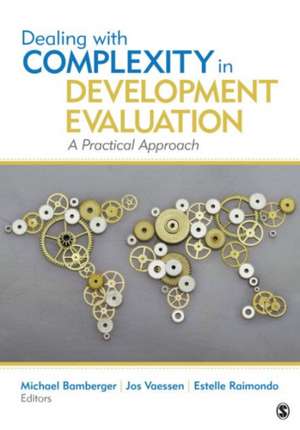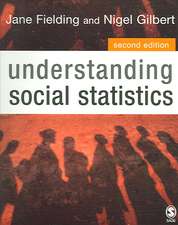Dealing With Complexity in Development Evaluation: A Practical Approach
Editat de J. Michael Bamberger, Jozef Leonardus Vaessen, Estelle R. (Rosine) Raimondoen Limba Engleză Paperback – 28 dec 2015
Preț: 568.54 lei
Preț vechi: 624.77 lei
-9% Nou
Puncte Express: 853
Preț estimativ în valută:
108.80€ • 112.95$ • 90.72£
108.80€ • 112.95$ • 90.72£
Carte tipărită la comandă
Livrare economică 25 martie-08 aprilie
Preluare comenzi: 021 569.72.76
Specificații
ISBN-13: 9781483344249
ISBN-10: 148334424X
Pagini: 480
Dimensiuni: 178 x 254 x 27 mm
Greutate: 0.86 kg
Ediția:1
Editura: SAGE Publications
Colecția Sage Publications, Inc
Locul publicării:Thousand Oaks, United States
ISBN-10: 148334424X
Pagini: 480
Dimensiuni: 178 x 254 x 27 mm
Greutate: 0.86 kg
Ediția:1
Editura: SAGE Publications
Colecția Sage Publications, Inc
Locul publicării:Thousand Oaks, United States
Recenzii
This volume provides useful guidance to development evaluation specialists to deal with their increasingly complex contexts and tasks.
The book shows, through a meticulous review of academic studies and some specific cases of real evaluations, that complex development interventions can be evaluated effectively and some of the techniques that make this possible.
This is the 'nuts and bolts' book that evaluation practitioners have been waiting for. Authored by highly experienced evaluators and grounded in real life examples from all parts of the world it illuminates the core ideas of complexity theory, makes sense of abstruse systems concepts and guides the reader through the contemporary maze of program theory, mixed methods and web based information technologies. A lucid and comprehensive treatment of the evaluation state of the art it is a must-have text for emerging evaluators, advanced evaluators and evaluation managers operating in uncertain, turbulent and conflict ridden environments.
This is an extremely useful book when managing and carrying out evaluations of the increasingly complex nature of international development. It should be required reading for everyone involved in assessing results of development cooperation.
This book is impressive in its breadth and depth of coverage of a topic increasingly on the minds of evaluation practitioners. It provides much needed practical guidance and valuable conceptual insights in an area that’s often discussed but rarely well understood. The book will appeal to a wide range of experienced evaluation professionals, emerging evaluators and students of evaluation.
This is one of the most important books ever published in the field of development evaluation. Dealing with complex systems is a premier challenge for evaluators working in real life situations. As a practitioner in the field I cannot emphasize the value of this book enough. The authors tackle the issue of complexity and its critical significance from both theoretical and practical points of view. They offer concrete ways in which evaluators and organizations can deal effectively with complexity. The editors, each one of them an eminent authority in the field, have put together a group of authors who bring a wealth of knowledge and experience to the table. Highly recommended to evaluation commissioners and practitioners, as well as those with an interest in the scientific aspects of evaluation approaches and methodologies.
This is the first book that seeks to operationalize a complexity perspective into mainstream development evaluation, focusing on the specificities of this broad based sector, encompassing multiple objectives, institutions, contexts, constituencies and beneficiaries. The main conclusions can speak then to larger audiences of evaluators, program designers, managers, and researchers throughout the world, making a very useful contribution to evaluation culture and practice.
The book shows, through a meticulous review of academic studies and some specific cases of real evaluations, that complex development interventions can be evaluated effectively and some of the techniques that make this possible.
This is the 'nuts and bolts' book that evaluation practitioners have been waiting for. Authored by highly experienced evaluators and grounded in real life examples from all parts of the world it illuminates the core ideas of complexity theory, makes sense of abstruse systems concepts and guides the reader through the contemporary maze of program theory, mixed methods and web based information technologies. A lucid and comprehensive treatment of the evaluation state of the art it is a must-have text for emerging evaluators, advanced evaluators and evaluation managers operating in uncertain, turbulent and conflict ridden environments.
This is an extremely useful book when managing and carrying out evaluations of the increasingly complex nature of international development. It should be required reading for everyone involved in assessing results of development cooperation.
This book is impressive in its breadth and depth of coverage of a topic increasingly on the minds of evaluation practitioners. It provides much needed practical guidance and valuable conceptual insights in an area that’s often discussed but rarely well understood. The book will appeal to a wide range of experienced evaluation professionals, emerging evaluators and students of evaluation.
This is one of the most important books ever published in the field of development evaluation. Dealing with complex systems is a premier challenge for evaluators working in real life situations. As a practitioner in the field I cannot emphasize the value of this book enough. The authors tackle the issue of complexity and its critical significance from both theoretical and practical points of view. They offer concrete ways in which evaluators and organizations can deal effectively with complexity. The editors, each one of them an eminent authority in the field, have put together a group of authors who bring a wealth of knowledge and experience to the table. Highly recommended to evaluation commissioners and practitioners, as well as those with an interest in the scientific aspects of evaluation approaches and methodologies.
This is the first book that seeks to operationalize a complexity perspective into mainstream development evaluation, focusing on the specificities of this broad based sector, encompassing multiple objectives, institutions, contexts, constituencies and beneficiaries. The main conclusions can speak then to larger audiences of evaluators, program designers, managers, and researchers throughout the world, making a very useful contribution to evaluation culture and practice.
Cuprins
Part 1: Dealing with Complexity in Development Evaluation: A Framework
Chapter 1: Complexity in Development Evaluation: The Framework of the Book - Michael Bamberger, Jos Vaessen, and Estelle Raimondo
Chapter 2: Toward More Complexity-Responsive Evaluations: Overview and Challenges - Estelle Raimondo, Jos Vaessen, and Michael Bamberger
Chapter 3: Management of Complexity-Responsive Evaluations - Michael Bamberger
Part 2: Dealing with Complexity in Development Evaluation: Methodological Approaches
Chapter 4: Impact Evaluation Approaches and Complexity - Jos Vaessen, Estelle Raimondo, and Michael Bamberger
Chapter 5: Understanding What is Being Evaluated: Theory-Based Evaluation - Frans L. Leeuw
Chapter 6: Five Practical Evaluation Problems to Which TBE Can Contribute - Frans L. Leeuw
Chapter 7: Dealing with Complexity by Unpacking and Reassembling Elements of a Complex Program - Michael Bamberger, Estelle Raimondo, and Jos Vaessen
Chapter 8: The Importance of a Mixed Methods Approach for Evaluating Complexity - Michael Bamberger
Part 3: Emerging Data and Innovative Techniques to Deal with Complexity in Development Evaluation
Chapter 9: Complexity in Review and Synthesis Studies - Jos Vaessen
Chapter 10: Emergent Technologies and Creative Use of Multiple Sources of Information - Susan van den Braak, Sunil Choenni, and Michael Bamberger
Chapter 11: Applying Emergent Technologies to Complex Program Evaluation From the INGO Perspective - Kerry Bruce and Alison E. Koler
Chapter 12: The Evaluation of Complex Development Interventions in the Age of Big Data - Emmanuel Letouzé, Ana Areias, and Sally Jackson
Part 4: Dealing with Complexity in Development Evaluation: The Institutional Challenges
Chapter 13: Dealing with Institutional Complexity: Implications for Evaluation Design, Process, and Use - Estelle Raimondo
Chapter 14: Gender Equality in Development Evaluation: The Intersection of Complexities - Estelle Raimondo and Michael Bamberger
Part 5: Complexity of Evaluation in Practice: Case Studies
Chapter 15: A Case Study in Complexity: Evaluating a Long-Term Effort to Prevent Gender-Based Violence in El Salvador - Allison R. Davis and Melida Guevera
Chapter 16: Microcredit and Women's Empowerment: Complexity in Systematic Review - Jos Vaessen, Ana Rivas and Frans L. Leeuw
Chapter 17: Evaluation of Coordination Against Trafficking in Persons: A Case Study of a Complexity-Responsive Evaluation - Kim Forss
Chapter 18: Complexity from the Perspective of Philanthropic Foundations and Their Evaluation Practices - Leny van Oijen
Chapter 19: Evaluating General Budget Support - Antonie de Kemp and Geske Dijkstra
Chapter 20: Dealing with Complexity in a Realist Synthesis: Community Accountability and Empowerment Initiatives - Gill Westhorp, Bill Walker, and Patricia Rogers
Glossary
Index
Chapter 1: Complexity in Development Evaluation: The Framework of the Book - Michael Bamberger, Jos Vaessen, and Estelle Raimondo
Chapter 2: Toward More Complexity-Responsive Evaluations: Overview and Challenges - Estelle Raimondo, Jos Vaessen, and Michael Bamberger
Chapter 3: Management of Complexity-Responsive Evaluations - Michael Bamberger
Part 2: Dealing with Complexity in Development Evaluation: Methodological Approaches
Chapter 4: Impact Evaluation Approaches and Complexity - Jos Vaessen, Estelle Raimondo, and Michael Bamberger
Chapter 5: Understanding What is Being Evaluated: Theory-Based Evaluation - Frans L. Leeuw
Chapter 6: Five Practical Evaluation Problems to Which TBE Can Contribute - Frans L. Leeuw
Chapter 7: Dealing with Complexity by Unpacking and Reassembling Elements of a Complex Program - Michael Bamberger, Estelle Raimondo, and Jos Vaessen
Chapter 8: The Importance of a Mixed Methods Approach for Evaluating Complexity - Michael Bamberger
Part 3: Emerging Data and Innovative Techniques to Deal with Complexity in Development Evaluation
Chapter 9: Complexity in Review and Synthesis Studies - Jos Vaessen
Chapter 10: Emergent Technologies and Creative Use of Multiple Sources of Information - Susan van den Braak, Sunil Choenni, and Michael Bamberger
Chapter 11: Applying Emergent Technologies to Complex Program Evaluation From the INGO Perspective - Kerry Bruce and Alison E. Koler
Chapter 12: The Evaluation of Complex Development Interventions in the Age of Big Data - Emmanuel Letouzé, Ana Areias, and Sally Jackson
Part 4: Dealing with Complexity in Development Evaluation: The Institutional Challenges
Chapter 13: Dealing with Institutional Complexity: Implications for Evaluation Design, Process, and Use - Estelle Raimondo
Chapter 14: Gender Equality in Development Evaluation: The Intersection of Complexities - Estelle Raimondo and Michael Bamberger
Part 5: Complexity of Evaluation in Practice: Case Studies
Chapter 15: A Case Study in Complexity: Evaluating a Long-Term Effort to Prevent Gender-Based Violence in El Salvador - Allison R. Davis and Melida Guevera
Chapter 16: Microcredit and Women's Empowerment: Complexity in Systematic Review - Jos Vaessen, Ana Rivas and Frans L. Leeuw
Chapter 17: Evaluation of Coordination Against Trafficking in Persons: A Case Study of a Complexity-Responsive Evaluation - Kim Forss
Chapter 18: Complexity from the Perspective of Philanthropic Foundations and Their Evaluation Practices - Leny van Oijen
Chapter 19: Evaluating General Budget Support - Antonie de Kemp and Geske Dijkstra
Chapter 20: Dealing with Complexity in a Realist Synthesis: Community Accountability and Empowerment Initiatives - Gill Westhorp, Bill Walker, and Patricia Rogers
Glossary
Index
Descriere
A practical guide for people who commission, implement and use evaluations of complex development interventions.











